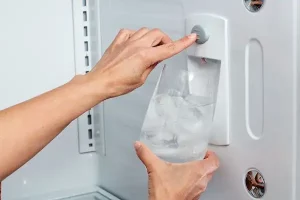 Welcome to the Refrigerator Repair Blog, where we explore the topic of ice maker issues in refrigerators. In this article, we provide a technical breakdown of the most common ice maker problems and guide you through the process of diagnosing and resolving these issues to ensure optimal refrigerator performance and ice production.
Welcome to the Refrigerator Repair Blog, where we explore the topic of ice maker issues in refrigerators. In this article, we provide a technical breakdown of the most common ice maker problems and guide you through the process of diagnosing and resolving these issues to ensure optimal refrigerator performance and ice production.
Table of Contents:
- Common Ice Maker Problems
- Troubleshooting Ice Maker Issues
- Repair Solutions for Ice Maker Problems
- Preventative Maintenance Tips
- Conclusion: Ensuring Efficient Ice Production
Common Ice Maker Problems
Ice maker issues in refrigerators can arise from various factors, including:
Insufficient Ice Production
Low ice production may result from issues with the water supply, temperature settings, or the ice maker’s internal components.
Ice Maker Not Dispensing Ice
An ice maker that fails to dispense ice may be experiencing problems with the dispenser motor, control board, or ice chute.
Ice Maker Overflows
An overflowing ice maker may be caused by a malfunctioning water inlet valve, incorrect water pressure, or a faulty ice maker control module.
Troubleshooting Ice Maker Issues
To diagnose ice maker issues, follow these steps:
Step 1: Check the Water Supply
Ensure the refrigerator is connected to a functioning water supply and that the water supply valve is open.
Step 2: Inspect the Water Inlet Valve
Examine the water inlet valve for signs of damage or obstruction, and ensure it is receiving the proper voltage.
Step 3: Evaluate the Ice Maker Assembly
Inspect the ice maker assembly for damage or wear, paying close attention to the feeler arm, gears, and other components.
Step 4: Assess the Temperature Settings
Verify that the refrigerator and freezer are set to the manufacturer’s recommended temperature settings.
Step 5: Examine the Dispenser Motor and Control Board
Inspect the dispenser motor and control board for signs of damage or malfunction.
Repair Solutions for Ice Maker Problems
Once the cause of the ice maker issue is identified, implement the appropriate repair solution:
Insufficient Ice Production
Adjust temperature settings, replace damaged water lines, or repair or replace faulty ice maker components to restore proper ice production.
Ice Maker Not Dispensing Ice
Replace a damaged dispenser motor, repair the control board, or clear any blockages in the ice chute to allow ice dispensing.
Ice Maker Overflows
Replace a malfunctioning water inlet valve, adjust the water pressure, or repair or replace the faulty ice maker control module to prevent overflows.
Preventative Maintenance Tips
To prevent ice maker issues in the future, follow these maintenance tips:
- Regularly clean the ice maker assembly and surrounding components to ensure proper functioning.
- Replace water filters according to the manufacturer’s recommendations to maintain optimal water quality.
- Periodically inspect water lines and connections for signs of wear or damage.
- Check the ice maker feeler arm to ensure it is functioning correctly and not obstructed.
- Schedule routine inspections and maintenance by a professional technician to identify and address potential issues before they escalate.
Frequently Asked Questions (FAQs)
How often should I clean my ice maker?
Clean your ice maker at least once every six months or more frequently if you notice a decrease in ice quality or production.
How can I improve the water quality for my ice maker?
Ensure you replace the refrigerator’s water filter according to the manufacturer’s recommendations, and consider installing a water filtration system for your home’s water supply.
What should I do if my ice maker is still not working after troubleshooting and attempting repairs?
If your ice maker continues to malfunction after following the troubleshooting and repair steps, consult a professional technician for further diagnosis and assistance.
Is it worth repairing my refrigerator’s ice maker, or should I consider a replacement?
The decision to repair or replace your refrigerator’s ice maker depends on factors such as the age and overall condition of the appliance, the extent of the issue, and the cost of repairs. Consult a professional technician for guidance in making the most cost-effective decision.
Conclusion: Ensuring Efficient Ice Production
By understanding the common ice maker issues and implementing effective troubleshooting and repair solutions, you can maintain an efficient and reliable ice production system in your refrigerator. Regular maintenance and prompt attention to potential problems will help extend the lifespan of your ice maker and ensure optimal refrigerator performance. Keep up with the Refrigerator Repair Blog for more technical insights, practical solutions, and expert advice on all aspects of refrigerator repair and maintenance.

